人教版初一(下)英语第20讲:unit 10语法篇(教师版)-张晶
七年级英语下册Unit10I’dlikesomenoodles短语、语法知识点汇总(新版)人教新目标版

Unit 10 I’d like some noodles基础归纳【教材内容解析】Section A1.What would you like? (P. 55)would like表示“想要”,相当于want,后接名词、代词或者动词不定式作宾语。
I would like a cup of tea now.2.I’m not sure yet. (P. 55)(1) sure的用法① be sure of/about sth. 对……确信Are you sure about the news?② be sure to do sth. 确保做某事Be sure to lock the door when you leave home.③ be sure that....确信……I am sure that he will come soon.④ make sure that...确保……Make sure that you can finish the job on time.(2)yet此处用作副词,表示“还、仍然”,常用于否定句和疑问句中。
Is everything ready yet?3. ---Are there any vegetables in the beef noodles?---Yes, there are some tomatoes. (P. 55)some一般用在肯定句中;any一般用在否定句、疑问句中。
例句:There are some birds in the tree. 例句:Do you have any questions?特殊情况:some可以用在疑问句中,表达“建议、请求、邀请” 并希望得到对方的肯定回答例句:Would you like some tea? 例句:Can I have some oranges?4.May I take your order? (P. 56)本句是服务员询问顾客是否点餐的常用交际语,order此处用作名词,表示“点菜”。
人教版七年级下册英语Unit 10 知识点语法归纳总结

Unit 10 I’d like some noodles.1.短语归纳2.典句必背3.用法集萃(1)What would you like? 你想要什么?❖本句是含would like 的特殊疑问句,结构为“What would+主语+like?”,用于询问“某人想要什么”。
其中would like 意为“想要”,相当于want,但语气比want更加委婉,多用于口语中,并且would like 没有人称和数的变化。
例:—What would you like? 你想要什么?—I’d like some tomatoes. 我想要一些西红柿。
❖would like有如下两种常见的句式,它们的结构、用法和答语分别是:(2)May I take your order? 您现在点菜吗?❖take one’s order意为“点菜”,其中order作名词,意为“点菜”。
例:You can give your order to the waiter. 你可以把你点的菜告诉服务员❖拓展:order还有如下词性和用法牛刀小试If you are late again, the teacher will order you ______ outside the classroom.A. standB.to standC.standingD. stands(3)What size would you like? 你想要多大的?❖本句是what size引导的特殊疑问句,其中size是名词,意为“大小;尺码”,该句用于询问某人想要多大的。
答语通常含有large, medium或small等。
例:—What size is your jacket? 你的夹克是多大尺码的?—Large. 大号的。
❖拓展:what size属于“what+名词” 构成的特殊疑问词组。
此类词组归纳:牛刀小试—We have some different skirts. ______ does your daughter want?—She wants a medium one.A. What colorB.What kindC. What sizeD. What sport(4)The number of candles is the person’s age. 蜡烛的数量是人的年龄❖辨析:the number of, a number of牛刀小试In our city there _____ a number of cars and the number of them _____ growing larger and larger.A.are; isB.have; isC.is; are(5)The birthday person must make a wish and blow out the candles. 过生日的人必须许愿并把蜡烛吹灭。
外研版初一(上)英语第20讲:Module 10 语法篇(教师版)
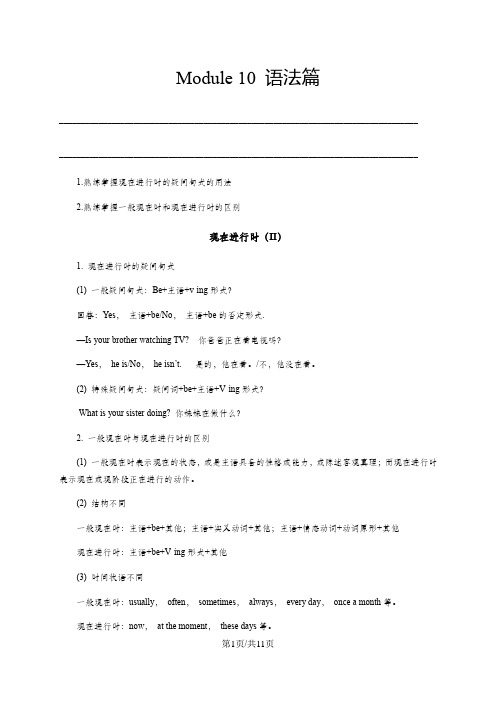
Module 10 语法篇____________________________________________________________________________________________________________________________________________________________________1.熟练掌握现在进行时的疑问句式的用法2.熟练掌握一般现在时和现在进行时的区别现在进行时(II)1. 现在进行时的疑问句式(1) 一般疑问句式:Be+主语+v-ing形式?回答:Yes,主语+be/No,主语+be的否定形式.—Is your brother watching TV? 你爸爸正在看电视吗?—Yes,he is/No,he isn’t. 是的,他在看。
/不,他没在看。
(2) 特殊疑问句式:疑问词+be+主语+V-ing形式?What is your sister doing? 你妹妹在做什么?2. 一般现在时与现在进行时的区别(1) 一般现在时表示现在的状态,或是主语具备的性格或能力,或陈述客观真理;而现在进行时表示现在或现阶段正在进行的动作。
(2) 结构不同一般现在时:主语+be+其他;主语+实义动词+其他;主语+情态动词+动词原形+其他现在进行时:主语+be+V-ing形式+其他(3) 时间状语不同一般现在时:usually,often,sometimes,always,every day,once a month等。
现在进行时:now,at the moment,these days等。
(4) 英语中有些动词如hear,know,like,love,want,have(拥有)等不可用于现在进行时,但可用于一般现在时。
(5)现在进行时有时可代替一般现在时,表示说话人的某种情绪,使句子具有强烈的感情色彩,常与always(总是),forever(永远)等连用。
人教版英语七年级下册unit-10语法总结
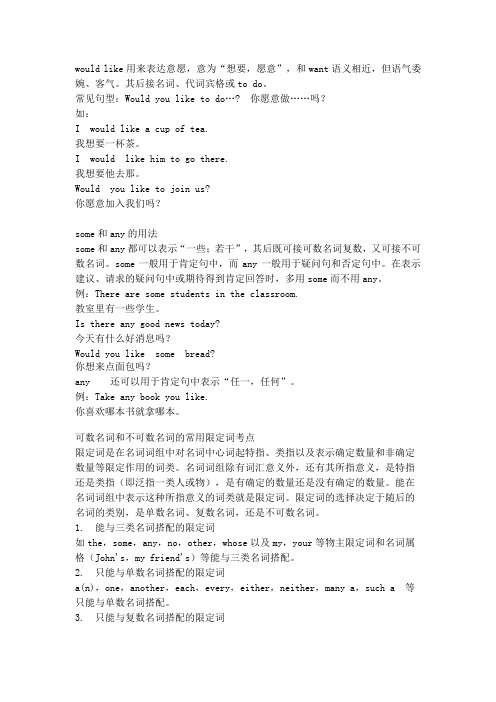
would like用来表达意愿,意为“想要,愿意”,和want语义相近,但语气委婉、客气。
其后接名词、代词宾格或to do。
常见句型:Would you like to do…?你愿意做……吗?如:I would like a cup of tea.我想要一杯茶。
I would like him to go there.我想要他去那。
Would you like to join us?你愿意加入我们吗?some和any的用法some和any都可以表示“一些;若干”,其后既可接可数名词复数,又可接不可数名词。
some一般用于肯定句中,而any一般用于疑问句和否定句中。
在表示建议、请求的疑问句中或期待得到肯定回答时,多用some而不用any。
例:There are some students in the classroom.教室里有一些学生。
Is there any good news today?今天有什么好消息吗?Would you like some bread?你想来点面包吗?any 还可以用于肯定句中表示“任一,任何”。
例:Take any book you like.你喜欢哪本书就拿哪本。
可数名词和不可数名词的常用限定词考点限定词是在名词词组中对名词中心词起特指、类指以及表示确定数量和非确定数量等限定作用的词类。
名词词组除有词汇意义外,还有其所指意义,是特指还是类指(即泛指一类人或物),是有确定的数量还是没有确定的数量。
能在名词词组中表示这种所指意义的词类就是限定词。
限定词的选择决定于随后的名词的类别,是单数名词、复数名词,还是不可数名词。
1. 能与三类名词搭配的限定词如the,some,any,no,other,whose以及my,your等物主限定词和名词属格(John's,my friend's)等能与三类名词搭配。
2. 只能与单数名词搭配的限定词a(n),one,another,each,every,either,neither,many a,such a 等只能与单数名词搭配。
人教版七年级下册英语Unit 10 语法知识归纳
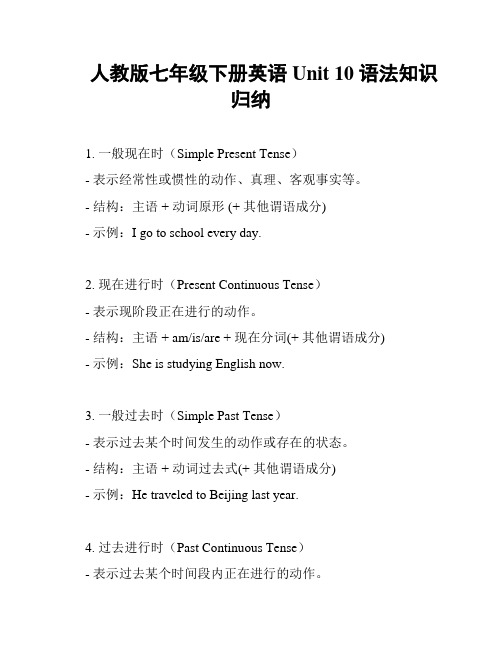
人教版七年级下册英语Unit 10 语法知识归纳1. 一般现在时(Simple Present Tense)- 表示经常性或惯性的动作、真理、客观事实等。
- 结构:主语 + 动词原形 (+ 其他谓语成分)- 示例:I go to school every day.2. 现在进行时(Present Continuous Tense)- 表示现阶段正在进行的动作。
- 结构:主语 + am/is/are + 现在分词(+ 其他谓语成分)- 示例:She is studying English now.3. 一般过去时(Simple Past Tense)- 表示过去某个时间发生的动作或存在的状态。
- 结构:主语 + 动词过去式(+ 其他谓语成分)- 示例:He traveled to Beijing last year.4. 过去进行时(Past Continuous Tense)- 表示过去某个时间段内正在进行的动作。
- 结构:主语 + was/were + 现在分词(+ 其他谓语成分)- 示例:They were playing basketball yesterday.5. 将来时(Future Tense)- 表示将来会发生的动作或存在的状态。
- 结构:主语 + will + 动词原形(+ 其他谓语成分)- 示例:We will have a party next week.6. 助动词的用法- “do”及其变化形式可用于否定句、疑问句和强调句。
- “be”用于进行时态和被动语态。
- “have”可用于完成时态。
- 示例:She doesn't like swimming. Did you go to the park? I do like chocolate.7. 特殊疑问词的用法- 针对特定方面的问题,使用特殊疑问词进行提问。
- 示例:What is your favorite color? Where did you go on vacation?以上是人教版七年级下册英语Unit 10关于语法知识的归纳。
人教版英语七年级下册第十单元短语语法知识点总结汇编
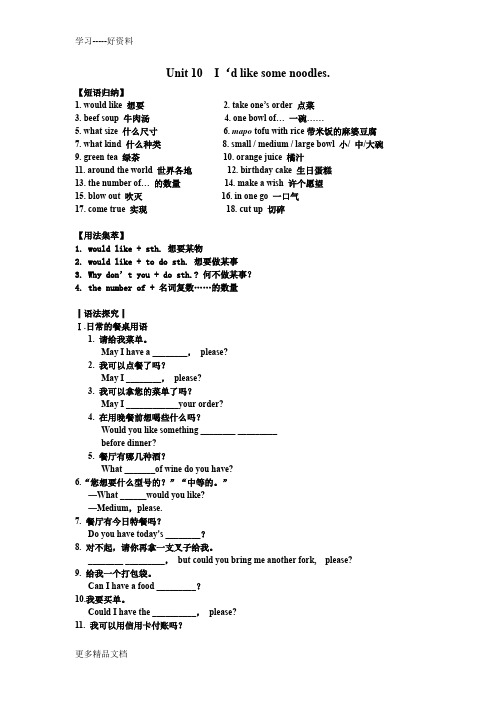
Unit 10I‘d like some noodles.【短语归纳】1. would like 想要2. take one’s order 点菜3. beef soup 牛肉汤4. one bowl of… 一碗……5. what size 什么尺寸6. mapo tofu with rice带米饭的麻婆豆腐7. what kind 什么种类8. small / medium / large bowl 小/ 中/大碗9. green tea 绿茶10. orange juice 橘汁11. around the world 世界各地12. birthday cake 生日蛋糕13. the number of… 的数量14. make a wish 许个愿望15. blow out 吹灭16. in one go 一口气17. come true 实现18. cut up 切碎【用法集萃】1. would like + sth. 想要某物2. would like + to do sth. 想要做某事3. Why don’t you + do sth.? 何不做某事?4. the number of + 名词复数……的数量┃语法探究┃Ⅰ.日常的餐桌用语1. 请给我菜单。
May I have a ________,please?2. 我可以点餐了吗?May I ________,please?3. 我可以拿您的菜单了吗?May I ____________your order?4. 在用晚餐前想喝些什么吗?Would you like something ________ _________before dinner?5. 餐厅有哪几种酒?What _______of wine do you have?6.“您想要什么型号的?”“中等的。
”—What ______would you like?—Medium,please.7. 餐厅有今日特餐吗?Do you have today's ________?8. 对不起,请你再拿一支叉子给我。
人教版七年级英语下册Unit10知识点归纳
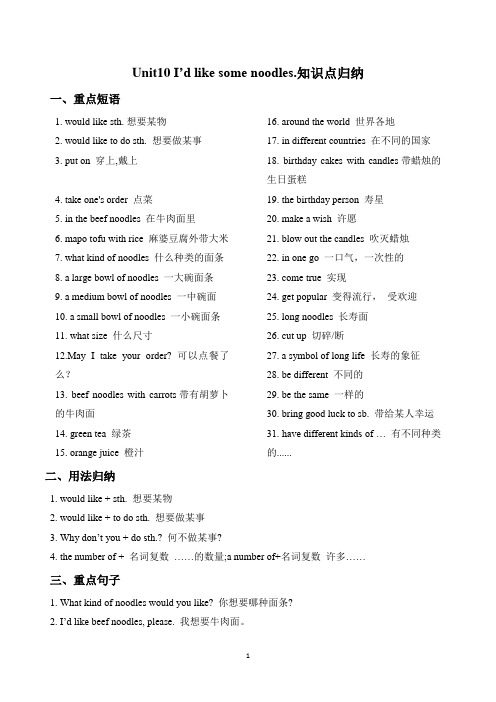
Unit10 I’d like some noodles.知识点归纳一、重点短语1. would like sth. 想要某物2. would like to do sth. 想要做某事3. put on 穿上,戴上4. take one's order 点菜5. in the beef noodles 在牛肉面里6. mapo tofu with rice 麻婆豆腐外带大米7. what kind of noodles 什么种类的面条8. a large bowl of noodles 一大碗面条9. a medium bowl of noodles 一中碗面10. a small bowl of noodles 一小碗面条11. what size 什么尺寸12.May I take your order? 可以点餐了么?13. beef noodles with carrots 带有胡萝卜的牛肉面14. green tea 绿茶15. orange juice 橙汁16. around the world 世界各地17. in different countries 在不同的国家18. birthday cakes with candles 带蜡烛的生日蛋糕19. the birthday person 寿星20. make a wish 许愿21. blow out the candles 吹灭蜡烛22. in one go 一口气,一次性的23. come true 实现24. get popular 变得流行,受欢迎25. long noodles 长寿面26. cut up 切碎/断27. a symbol of long life 长寿的象征28. be different 不同的29. be the same 一样的30. bring good luck to sb. 带给某人幸运31. have different kinds of … 有不同种类的......二、用法归纳1. would like + sth. 想要某物2. would like + to do sth. 想要做某事3. Why don’t you + do sth.? 何不做某事?4. the number of + 名词复数……的数量;a number of+名词复数许多……三、重点句子1. What kind of noodles would you like? 你想要哪种面条?2. I’d like beef noodles, please. 我想要牛肉面。
人教版七年级英语(下册)Unit 10词汇、句型精讲

人教版▏七年级英语(下册)Unit 10 词汇、句型精讲词汇精讲1. potatopotato 可数名词,意为“土豆、马铃薯”,其复数形式为potatoes。
例如:I don’t like potatoes. 我不喜欢马铃薯。
注意:部分以字母o结尾的名词,变为复数时,在词尾加-es。
例如:tomato (西红柿) → tomatoeshero (英雄) → heroesNegro (黑人) → Negroes我们可以用“黑人英雄爱吃西红柿和马铃薯”这个顺口溜来记住这几个词。
2. sizesize是名词,它的意思是“尺寸、大小”,既可以表示物体的大小,又可以表示服装、鞋帽的尺码、号码。
What size引导的特殊疑问句经常用来询问规格或者尺码。
例如:-What size shirt do you want? 你要多大号的衬衫?-I want size 36. 我要36号的。
3. small, medium&largesmall, medium, large都可以用来表示物体的型号,small是小号,medium是中号,large 是大号。
这三个词可以放在表示量的词前做修饰,来说明具体的要求。
例如,a bowl of 的意思是“一碗”,表示“大碗、中碗、小碗”时,分别在bowl前面加上“large, medium, small”即可。
例如:-What would you like? 您想要点什么?-I’d like a large bowl o f beef noodles. 我要一大碗牛肉面。
4. special(1)special作名词时,意为“特色菜、特价品、特别的事物”等。
例如:The train is a special for the football game.那班火车是为足球赛开的专车。
The menu changes regularly and there are daily specials to choose from.菜谱定期更换,而且每天都有特色菜供选择。
人教版初中英语七年级下册Unit10语法指导与练习.docx

人教版初中英语七年级下册Unit10 语法指导与练习Unit 10 I ’d like some noodlesUnit 10 语法指导与练习语法指导可数名词与不可数名词【教材原句】1.—— What kind of noodles would you like—— I’d like beef noodles,please.2.Can we have two bowl of beef soup thenthere any meat in the tomato and egg soup以上例句中的性质分为名词和都是不可数名词。
名词按其所表示的事物的名词。
(beef, soup,meat;可数;不可数)【语法透析】一、可数名词与不可数名词的区别普通名词所表示的人或事物是可以按个数计算的,这类名词叫可数名词。
可数名词分为个体名词(表示某类人或事物中的个体,如worker,farmer,desk,factory 等)和集体名词(表示作为一个整体来看的一群人或一些事物,如 people,family 等)。
如果普通名词所表示的事物是不能按个数来计算的,这类名词就叫不可数名词。
不可数名词分为物质名词(表示无法分为个体的物质,如 meat,rice,water,milk ,orange 等)和抽象名词(表示动作、状态、情况、品质等抽象概念,如work,homework ,time ,health, friendship 等)。
二、可数名词的复数可数名词有单数和复数两种形式。
名词由单数形式变成复数形式的规则如下:1.一般的名词词尾直接加 -s。
如: books, rooms,houses,days。
2.以 s,x,sh,ch结尾的名词,在词尾加 -es.如:buses,glasses,watches,dishes,boxes。
3.以辅音字母+ y 结尾的名词,变y 为 i 加-es 变复数。
如baby→babies,factory-factories,body-bodies,city-cities。
人教版英语七年级下册1-10单元知识点讲解
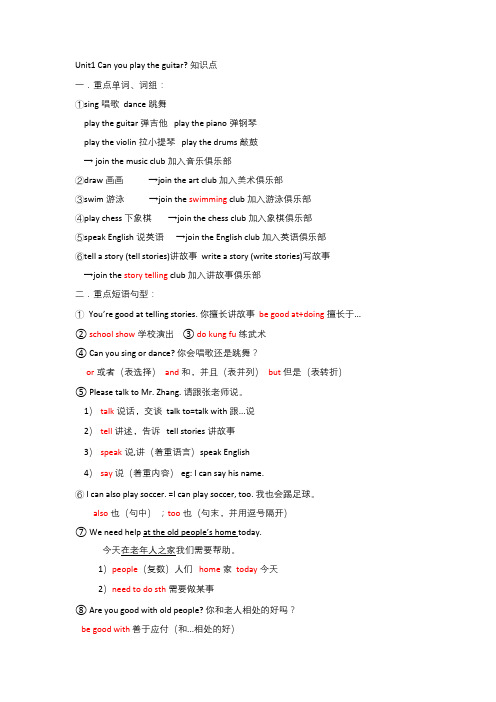
Unit1 Can you play the guitar? 知识点一.重点单词、词组:①sing 唱歌 dance跳舞play the guitar 弹吉他 play the piano弹钢琴play the violin拉小提琴 play the drums敲鼓→ join the music club 加入音乐俱乐部②draw画画→join the art club 加入美术俱乐部③swim游泳→join the swimming club 加入游泳俱乐部④play chess 下象棋→join the chess club 加入象棋俱乐部⑤speak English说英语→join the English club 加入英语俱乐部⑥tell a story (tell stories)讲故事 write a story (write stories)写故事→join the story telling club 加入讲故事俱乐部二.重点短语句型:①You’re good at telling stories. 你擅长讲故事be good at+doing擅长于...②school show学校演出③ do kung fu练武术④ Can you sing or dance? 你会唱歌还是跳舞?or或者(表选择) and和,并且(表并列) but但是(表转折)⑤ Please talk to Mr. Zhang. 请跟张老师说。
1)talk说话,交谈 talk to=talk with跟...说2)tell 讲述,告诉 tell stories讲故事3)speak说,讲(着重语言)speak English4)say说(着重内容) eg: I can say his name.⑥ I can also play soccer. =I can play soccer, too. 我也会踢足球。
人教版初一(下)英语第20讲:unit10语法篇(教师版)
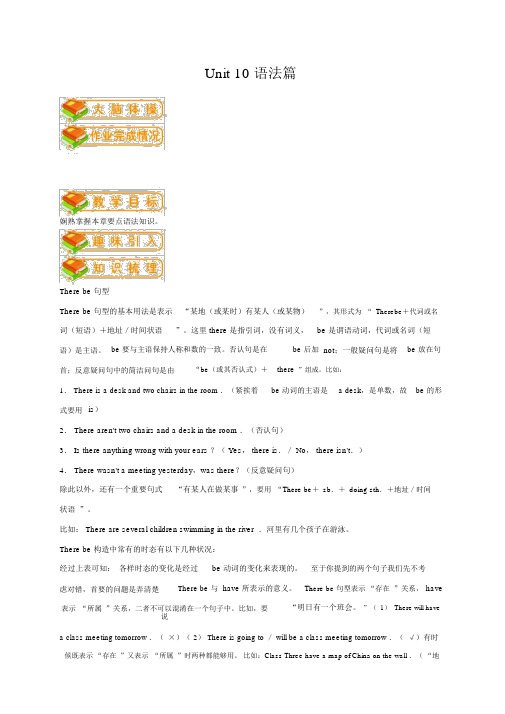
Unit 10 语法篇____________________________________________________________________________________________________________________________________________________________________娴熟掌握本章要点语法知识。
There be 句型There be 句型的基本用法是表示“某地(或某时)有某人(或某物)”,其形式为“ Therebe+代词或名词(短语)+地址/时间状语”。
这里 there 是指引词,没有词义,be 是谓语动词,代词或名词(短语)是主语。
be 要与主语保持人称和数的一致。
否认句是在be 后加not;一般疑问句是将be 放在句首;反意疑问句中的简洁问句是由“be(或其否认式)+there ”组成。
比如:1. There is a desk and two chairs in the room .(紧挨着be 动词的主语是 a desk,是单数,故be 的形式要用is)2. There aren't two chairs and a desk in the room .(否认句)3. Is there anything wrong with your ears ?( Yes, there is./ No, there isn't.)4. There wasn't a meeting yesterday,was there?(反意疑问句)除此以外,还有一个重要句式“有某人在做某事”,要用“There be+sb.+doing sth.+地址/时间状语”。
比如: There are several children swimming in the river .河里有几个孩子在游泳。
There be 构造中常有的时态有以下几种状况:经过上表可知:各样时态的变化是经过be 动词的变化来表现的。
人教版初二(下)英语第20讲unit10语法篇(学生版)
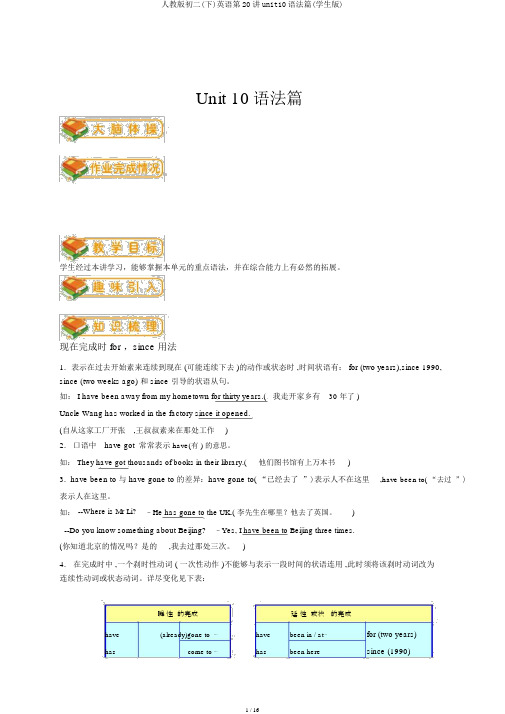
Unit 10语法篇____________________________________________________________________________________________________________________________________________________________________学生经过本讲学习,能够掌握本单元的重点语法,并在综合能力上有必然的拓展。
现在完成时 for ,since 用法1.表示在过去开始素来连续到现在 (可能连续下去 )的动作或状态时 ,时间状语有: for (two years),since 1990, since (two weeks ago) 和 since 引导的状语从句。
如: I have been away from my hometown for thirty years.(我走开家乡有30 年了 )Uncle Wang has worked in the factory since it opened.(自从这家工厂开张,王叔叔素来在那处工作)2.口语中have got常常表示have(有 ) 的意思。
如: They have got thousands of books in their library.(他们图书馆有上万本书)3. have been to 与 have gone to 的差异:have gone to( “已经去了”)表示人不在这里,have been to( “去过”)表示人在这里。
如:--Where is Mr Li?–He has gone to the UK.( 李先生在哪里?他去了英国。
)--Do you know something about Beijing?–Yes, I have been to Beijing three times.(你知道北京的情况吗?是的,我去过那处三次。
【教育资料】外研版初一(下)英语第20讲:Module10语法篇(学生版)学习精品
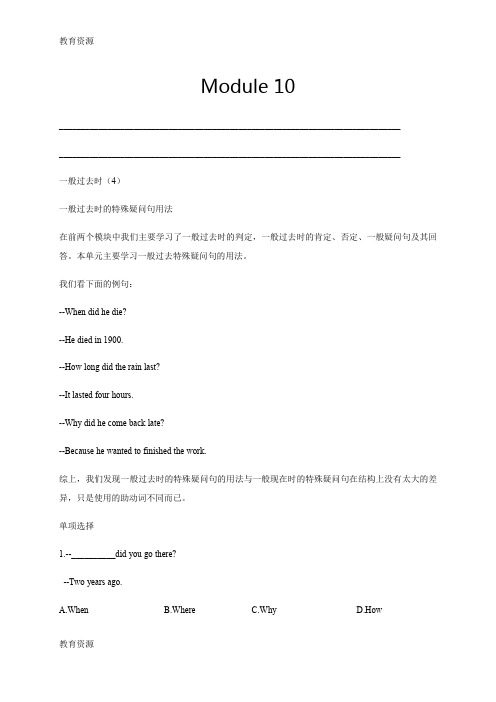
Module 10____________________________________________________________________________________________________________________________________________________________一般过去时(4)一般过去时的特殊疑问句用法在前两个模块中我们主要学习了一般过去时的判定,一般过去时的肯定、否定、一般疑问句及其回答。
本单元主要学习一般过去特殊疑问句的用法。
我们看下面的例句:--When did he die?--He died in 1900.--How long did the rain last?--It lasted four hours.--Why did he come back late?--Because he wanted to finished the work.综上,我们发现一般过去时的特殊疑问句的用法与一般现在时的特殊疑问句在结构上没有太大的差异,只是使用的助动词不同而已。
单项选择1.--__________did you go there?--Two years ago.A.WhenB.WhereC.WhyD.How2.--__________did it take to get there?--About nine hours.A.How farB.How oftenC.How longD.How many3.--__________did you buy?--Two bags.A.WhenB.WhereC.WhyD.What4.--__________did you spend your holiday?--I spent my holiday in Shanghai.A.WhenB.WhereC.WhyD.What5.--__________did he go to school?--By bus.A.HowB.WhereC.WhyD.What基础演练单项选择1.-- __________met her at the airport?--Lucy.A.HowB.WhereC.WhoD.What2.--__________did Jenny see there?--He saw many interesting things.A.HowB.WhichC.WhoD.What3.--__________did they stand there?--Because they made mistakes.A.HowB.WhereC.WhoD.Why4.--_________Tom’s mother go to LA?--Four days ago.A.HowB.WhenC.WhoD.What5.--__________students attend the club?--Thirty.A.How farB.How oftenC.How longD.How many巩固提高就划线部分提问1.My family went to the beach last week.________________________________________2.We read English last night .________________________________________3.Tom did his homework yesterday morning.________________________________________4.He flew to the USA five days ago._________________________________________5.Peter spent four days painting his home._________________________________________单项选择1.--__________did he leave home ?--Ten hours ago.A.HowB.WhenC.WhoD.What2.--__________ did your English teacher show pictures to you?--By PPT.A.HowB.WhereC.WhoD.Why3.__________did your mother break yesterday?A.HowB.WhenC.WhoD.What4.__________children swam in the river yesterday?A.How farB.How oftenC.How longD.How many5.--__________ did Mary find the dog?--She found it in bedroom.A.HowB.WhereC.WhoD.Why6.--_________did your sister eat for lunch?--Hamburger.A.WhoB.WhatC.WhenD.Where7.--_________did they pay for your brother?--Fifth yuan.A.How muchB.How oftenC.How longD.How many8.--_________taught you to swim at school yesterday.A.WhoB.WhatC.WhenD.Where9.--_________did Lily spend her weekend ?--She spent it in the USA.A.WhoB.WhatC.WhenD.Where10.--________ did you cry just now?--Because I hurt my leg.A.HowB.WhereC.WhoD.Why完形填空It was too late at night when an old man came to a small town. He found a small hotel and wanted to stay there for the night. After he ___1____ his room, the owner said to the wife, "Look at his bag. There must be ___2____ money in it. Let's take it away when he ____3____, shall we?""No, no." said the woman. "He must look ____4____ his bag tomorrow morning. If he can't find it, he'll telephone the police."They thought for ___5____ minutes. Then the woman had an idea. "We have forgetful grass. Why not put some forgetful grass into his food? If he has the food, he will forget ___6_____ his bag away."The old man had the food with the forgetful grass and went to bed. The next morning when the owner got up, he found the door ___7___ and the old man had left with the bag. He was ___8____ and woke his wife up, "What a fool! Your forgetful grass isn't ___9____ at all.""No, I don't think so. H must forget something, "his wife said."Oh! I remember now!" cried out the man suddenly. "He forgot to ___10___ the night."1. A. left B. went into C. had gone D. came2. A. many B. little C. much D. a little3. A. goes out B. is asleep C. leaves D. has food4. A. at B. for C. after D. like5. A. few B. little C. a little D. a few6. A. to find B. to bring C. to take D. to put7. A. open B. broken C. close D. locked8. A. happy B. sorry C. angry D. polite9. A. important B. useful C. bad D. wrong10. A. take B. cost C. pay D. spend______________________________________________________________________________ ______________________________________________________________________________ 丰台区期末1. Peter comes from Australia. ______ is a teacher.A. IB. SheC. HeD. It2. Our family will leave for Shanghai______ Sunday morning.A. onB. atC. inD. for3. Linda is very kind, _______ many people like her.A. andB. soC. orD. but4. Our playground is one of _____ playgrounds in our city.A. bigB. biggerC. biggestD. the biggest5. My mother often teaches me how_______.A. cooksB. cookC. cookingD. to cook单项选择:st Sunday evening,he__________cards on his computer.A.playsB.playingC.playedD.play2.My father enjoys__________books after dinner every day.A.readB.readingC.readsD.to read3.Ann wanted__________to the shop with you.A.to wentB.wentC.and wentD.to go4.Playing games__________much time,I think.A.spendsB.takesesD.pays5.--__________ did you go with?--My parents.A.WhoB.WhatC.WhenD.Where6.--__________did you stay there?--For three days.A.How muchB.How oftenC.How longD.How many7._________Mr King__________to school by bike when he was a boy?A.Did,rideB.Did,ridesC.Does,rideD.Does,rides8.--When did you __________ at the airport?--At five o’clock.A.getB.goC.reachD.arrives9.--How __________ your party?--It was very__________.A.was,relaxingB.was,relaxedC.is,relaxingD.is,relaxed10.What__________Mike__________on his last school trip?A.Does,didB.did,didC.did,doD.do,do完形填空:When I was thirteen,my family moved from Boston to Tucson,Arizona.__1__ the move,my fatherasked us to get together in the living—room on a freezing January night.My sisters and I sat around the fire,and we did not __2__ that the universe would suddenly change its course(轨道).“In May,we’re moving to Arizona.”said my father.The words,so small,didn’t seem __3__ enough to hold my new life.But the world changed and I woke up on a train moving across the country.I watched the views outside the window __4__ from green trees to plains(平原)and to high mountains.At that time I also saw some strange new plants.Finally,we arrived and settled(安顿)into our new home.When my older sisters were still __5__ for losing friends,I started to explore our new neighborhood.One afternoon,I was out exploring __6__ and saw a new kind of cactus(仙人掌).I moved closer and looked at it.“You’d better not __7__ that.”I turned around to see an old woman.“Are you new to this neighborhood?”I explained that I was.“My name is Ina Thorn.Do you know anything about life in the __8__? It must be quite different from living in Boston.”How could I explain how I found the desert? I couldn’t seem to find the right words.“It’s big and wild,”She __9__ That was it.That was the feeling I had when I first saw the mountains of my new home, At that moment,I understood how much my __10__ had changed and would change with just a few simple words.“Would you like to come to my home tomorrow? Someone should teach you things about plants in the desert.”1.A.During B.Until C.After D.Before2.A.hope B.imagine C.realize D.believe 3.A.good B.useful C.big D.helpful4.A.move B.change C.run D.become 5.A.worried B.excited C.sad D.afraid6.A.as well B.as usual C.at once D.on time 7.A.take B.touch C.hold D.hurt8.A.desert B.city C.country D.mountains 9.A.answered B.agreed C.decided D.offered 10.A.idea B.life C.home D.Fatally阅读理解AThe 2019 Summer Olympics was held in London, UK. The city becomes the first in history to host the Olympic Games three times.The London 2019 Olympic mascots,which are named after two small English towns, are Wedlock and Mandible. They only have one eye. But they look very friendly. Wedlock is wearing bracelets(手链)in the colors of the Olympic rings. UK children and families helped design the mascots.On May 5, 2019, the Olympic Stadium opened in east London. Schoolchildren in London were the stars of the day. Niamey Clarke-Willis,a 9-year-old girl, pressed the button to open the Olympic Stadium with London 2019 Chairman Sebastian Co. There were more than 40,000 people taking part in the ceremony. The stadium can hold 80,000 people,It hosted the Opening Ceremony of the London Olympics on July 27. The tickets for the London 2019 Olympics went on sale on March 15,500 days before the Games began. There were 6. 6 million tickets to buy in six weeks. The cheapest cost is $ 20(210yuan) and the most expensive is $ 2,012(21,000yuan).1. How many times has London held the Olympic Games?A. Once.B. Twice.C. Three times.D. Four times.2. What do the names of the 2019 Summer Olympic mascots come from?A. Two UK children.B. Two UK officers.C. Two UK families.D. Two small English towns.3. Which of the following is Not True?A. The mascots have two big eyes.B. The stadium can hold 80,000 people.C. The Olympic Stadium opened in east London.D. The Opening Ceremony of the London Olympics was held on July 27, 2019.BAlma, our lovely dog, isn’t with us any more. She died several years ago. But while sharing our home, she brought such joy and love that we still miss her.It was an autumn day in Minnesota, US. We were hit by a big snow fall for which no one was prepared.We have two apple trees in our backyard. Alma loved apples. When she went outside, she’d hold an apple and take it into the house to save for eating later. The apples had been on the ground and were often dirty. So I wasn’t always happy that Alma had brought them into the house. Feeling my displeasure, she would turn her head so I wouldn’t see her hidden treasure. It was our little game.One day it snowed too early in the season, and Alma went outside and I noticed that she was madly digging holes and bringing the apples to the surface so they could be seen above the snow. She seemed busy digging up as many apples as possible during her yard time.When I called her back into the house, she had her usual one apple in her mouth. About five minutes later, I looked outside. The yard was full of birds. Alma had dug up all those apples for her bird friends to eat. She knew that they didn’t have enough food to live through such an early winter. As I saw this, tears filled my eyes. Alma knew how to serve life with such kindness.1. There was a big snow fall in Minnesota, US _______.A.in spring B.in summer C.in autumn D.in winter2. Alma dug up the apples in the snow because________.A.she loved playing with snow in winterB.she liked digging holes and eating applesC.she wanted to save more apples for eating laterD.she wanted to leave the apples to her bird friends3. From the story we can learn that______.A.Alma was lovely and braveB.Alma was strong and helpfulC.Alma was kind and thoughtfulD.Alma was careful and hardworkingCHappiness is a feeling that lights up your eyes, makes your steps light and makes you want to sing for no reason. Everyone wants to be happy. But sometimes, a guest comes in without invitation. It’s unhappiness. Don’t let it get you down. Send it away!When you are happy, the world feels like a better place. As the saying goes: When you smile, the world smiles with you; when you cry, you cry alone. Wearing a smile will make you more charming and help you to win lots of friends. A good mood always gives you hope, which makes trouble and problems easier to handle.No matter how happy you are, it’s normal to feel angry, sad or gloomy once in a while. Life is full of ups and downs. We can’t cha nge the way life is, but we can do our best to change a bad situation into agood one. To help us do this, it’s good to know some of the factors (因素) that influence happiness.One of the biggest factors is social relationships. People who are close to family and friends are happier than people who don’t have those relationships. Talking and sharing is a good way to relax and build confidence. Knowing someone is there for you will make you braver and more outgoing.Another factor is work or school. If you enjoy school, even if you have lots of homework or extra classes, you will still feel that your school life is meaningful and happy. But if you hate school, your negative attitude may cause you to feel bored and upset that you have to do so much work.A third factor is your attitude towards life. How do you feel if you fail in an exam? Maybe you think it’s unfair because you always study hard and should get a good mark. You can't stop blaming(责备) yourself. Or, maybe you accept it. You go through the paper carefully, find out why you made stupid mistakes, and tell yourself, "Take it easy! I’ll do better next time!" Your attitude makes a big difference.Do you smile a lot or wear a long face most of the time?1. What can we know from Paragraph 3?A. We often change bad situations in life.B. We often go upstairs and downstairs in life.C. We have both happy and sad moments in life.D. We spend neither happy nor angry time in life.2. The writer probably agrees that _______________.A. we can’t be happy if we are busy with our studiesB. we should accept our failure and try to do better next timeC. we should keep blaming ourselves when we fail in an examD. we will feel less happy when we are closer to people around us3. What is the passage mainly about?A. How to control our bad feeling.B. What factors make our life easy.C. What factors influence happiness.D. How to make our own happiness.。
外研版初一(下)英语第20讲:Module10语法篇(教师版)
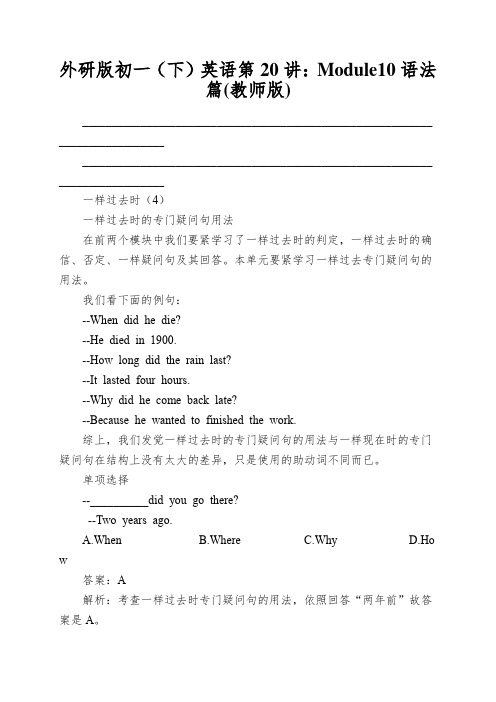
外研版初一(下)英语第20讲:Module10语法篇(教师版)____________________________________________________________ ______________________________________________________________________________ __________________一样过去时(4)一样过去时的专门疑问句用法在前两个模块中我们要紧学习了一样过去时的判定,一样过去时的确信、否定、一样疑问句及其回答。
本单元要紧学习一样过去专门疑问句的用法。
我们看下面的例句:--When did he die?--He died in 1900.--How long did the rain last?--It lasted four hours.--Why did he come back late?--Because he wanted to finished the work.综上,我们发觉一样过去时的专门疑问句的用法与一样现在时的专门疑问句在结构上没有太大的差异,只是使用的助动词不同而已。
单项选择--__________did you go there?--Two years ago.A.WhenB.WhereC.WhyD.Ho w答案:A解析:考查一样过去时专门疑问句的用法,依照回答“两年前”故答案是A。
--__________did it take to get there?--About nine hours.A.How farB.How oftenC.How longD.How many答案:C解析:考查一样过去时专门疑问句的用法,依照回答“9个小时”是时刻段故选C。
--__________did you buy?--Two bags.A.WhenB.WhereC.WhyD.W hat答案:D解析:依照句子回答可知是买了什么,故选D。
人教版初二(下)英语第20讲:unit10语法篇(教师版)
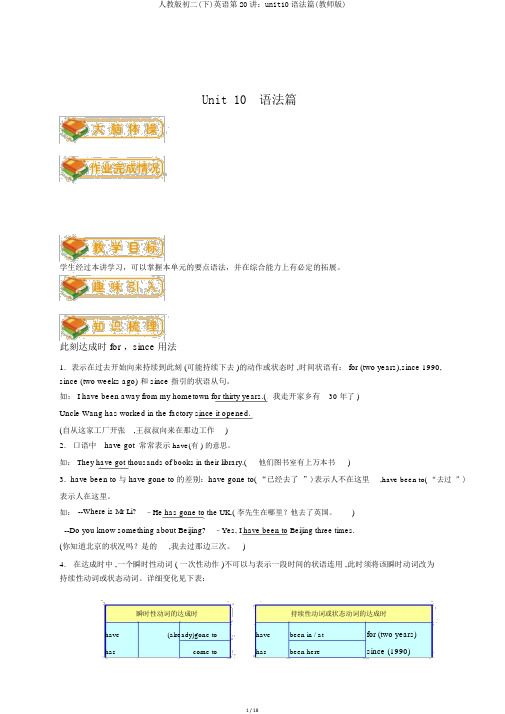
Unit 10 语法篇____________________________________________________________________________________________________________________________________________________________________学生经过本讲学习,可以掌握本单元的要点语法,并在综合能力上有必定的拓展。
此刻达成时 for ,since 用法1.表示在过去开始向来持续到此刻 (可能持续下去 )的动作或状态时 ,时间状语有: for (two years),since 1990, since (two weeks ago) 和 since 指引的状语从句。
如: I have been away from my hometown for thirty years.(我走开家乡有30 年了 )Uncle Wang has worked in the factory since it opened.(自从这家工厂开张,王叔叔向来在那边工作)2.口语中have got常常表示have(有 ) 的意思。
如: They have got thousands of books in their library.( 他们图书室有上万本书)3. have been to 与 have gone to 的差别:have gone to( “已经去了”)表示人不在这里,have been to( “去过”)表示人在这里。
如:--Where is Mr Li? –He has gone to the UK.( 李先生在哪里?他去了英国。
)--Do you know something about Beijing?–Yes, I have been to Beijing three times.(你知道北京的状况吗?是的,我去过那边三次。
外研版初一(下)英语第20讲:Module10语法篇
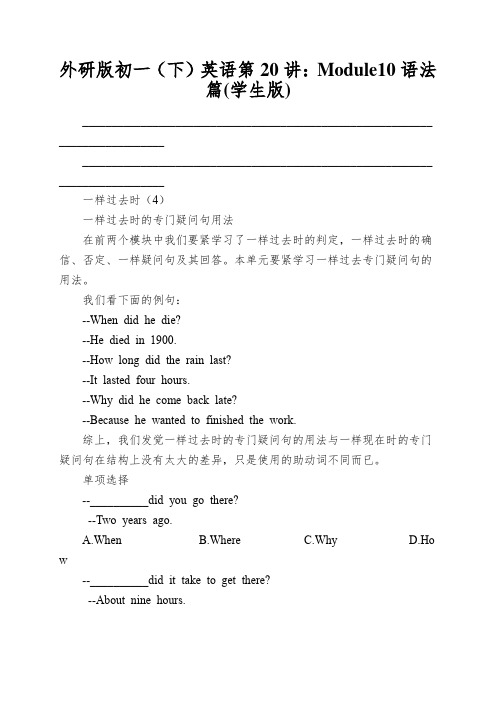
外研版初一(下)英语第20讲:Module10语法篇(学生版)____________________________________________________________ ______________________________________________________________________________ __________________一样过去时(4)一样过去时的专门疑问句用法在前两个模块中我们要紧学习了一样过去时的判定,一样过去时的确信、否定、一样疑问句及其回答。
本单元要紧学习一样过去专门疑问句的用法。
我们看下面的例句:--When did he die?--He died in 1900.--How long did the rain last?--It lasted four hours.--Why did he come back late?--Because he wanted to finished the work.综上,我们发觉一样过去时的专门疑问句的用法与一样现在时的专门疑问句在结构上没有太大的差异,只是使用的助动词不同而已。
单项选择--__________did you go there?--Two years ago.A.WhenB.WhereC.WhyD.Ho w--__________did it take to get there?--About nine hours.A.How farB.How oftenC.How longD.How many--__________did you buy?--Two bags.A.WhenB.WhereC.WhyD.W hat--__________did you spend your holiday?--I spent my holiday in Shanghai.A.WhenB.WhereC.WhyD.W hat--__________did he go to school?--By bus.A.HowB.WhereC.WhyD.W hat基础演练单项选择--__________met her at the airport?--Lucy.A.HowB.WhereC.WhoD.W hat--__________did Jenny see there?--He saw many interesting things.A.HowB.WhichC.WhoD.W hat--__________did they stand there?--Because they made mistakes.A.HowB.WhereC.WhoD.W hy--_________Tom’s mother go to LA?--Four days ago.A.HowB.WhenC.WhoD.W hat--__________students attend the club?--Thirty.A.How farB.How oftenC.How longD.How many巩固提高就划线部分提问1.My family went to the beach last week.________________________________________We read English last night .________________________________________Tom did his homework yesterday morning.________________________________________4.He flew to the USA five days ago._________________________________________5.Peter spent four days painting his home._________________________________________单项选择--__________did he leave home ?--Ten hours ago.A.HowB.WhenC.WhoD.W hat2.--__________ did your English teacher show pictures to you?--By PPT.A.HowB.WhereC.WhoD.W hy__________did your mother break yesterday?A.HowB.WhenC.WhoD.W hat__________children swam in the river yesterday?A.How farB.How oftenC.How longD.How many--__________ did Mary find the dog?--She found it in bedroom.A.HowB.WhereC.WhoD.W hy--_________did your sister eat for lunch?--Hamburger.A.WhoB.WhatC.WhenD.Where--_________did they pay for your brother?--Fifth yuan.A.How muchB.How oftenC.How longD.How many--_________taught you to swim at school yesterday.A.WhoB.WhatC.WhenD.Where--_________did Lily spend her weekend ?--She spent it in the USA.A.WhoB.WhatC.WhenD.Where--________ did you cry just now?--Because I hurt my leg.A.HowB.WhereC.WhoD.W hy完形填空It was too late at night when an old man came to a small town. H e found a small hotel and wanted to stay there for the night. After he __ _1____ his room, the owner said to the wife, "Look at his bag. There m ust be ___2____ money in it. Let's take it away when he ____3____, sha ll we?""No, no." said the woman. "He must look ____4____ his bag to morrow morning. If he can't find it, he'll telephone the police."They thought for ___5____ minutes. Then the woman had an id ea. "We have forgetful grass. Why not put some forgetful grass into his f ood? If he has the food, he will forget ___6_____ his bag away."The old man had the food with the forgetful grass and went to bed. The next morning when the owner got up, he found the door ___7_ __ and the old man had left with the bag. He was ___8____ and woke his wife up, "What a fool! Your forgetful grass isn't ___9____ at all.""No, I don't think so. H must forget something, "his wife said."Oh! I remember now!" cried out the man suddenly. "He forgot to _ __10___ the night."1. A. left B. went into C. had goneD. came2. A. many B. little C. much D. a little3. A. goes out B. is asleep C. leaves D. h as food4. A. at B. for C. afterD. like5. A. few B. little C. a little D. a few6. A. to find B. to bring C. to takeD. to put7. A. open B. broken C. closeD. locked8. A. happy B. sorry C. angryD. polite9. A. important B. useful C. bad D. w rong10. A. take B. cost C. payD. spend____________________________________________________________ ______________________________________________________________________________ __________________丰台区期末1. Peter comes from Australia. ______ is a teacher.A. IB. SheC. HeD. It2. Our family will leave for Shanghai______ Sunday morning.A. onB. atC. inD. for3. Linda is very kind, _______ many people like her.A. andB. soC. orD. but4. Our playground is one of _____ playgrounds in our city.A. bigB. biggerC. biggestD. the b iggest5. My mother often teaches me how_______.A. cooksB. cookC. cookingD. to cook单项选择:Last Sunday evening,he__________cards on his computer.A.playsB.playingC.playedD.pla yMy father enjoys__________books after dinner every day.A.readB.readingC.readsD.to read3.Ann wanted__________to the shop with you.to went B.went C.and went D.to go Playing games__________much time,I think.spends B.takes es D.pays--__________ did you go with?--My parents.A.WhoB.WhatC.WhenD.W here--__________did you stay there?--For three days.A.How muchB.How oftenC.How longD.How many_________Mr King__________to school by bike when he was a boy?Did,ride B.Did,rides C.Does,ride D.Does,ri des--When did you __________ at the airport?--At five o’clock.get B.go C.reach D.arrives --How __________ your party?--It was very__________.was,relaxing B.was,relaxed C.is,relaxing D.is,relax edWhat__________Mike__________on his last school trip?Does,did B.did,did C.did,do D.do,do 完形填空:When I was thirteen,my family moved from Boston to Tucson,Arizona.__1__ the move,my father asked us to get together in the livi ng—room on a freezing January night.My sisters and I sat around the fi re,and we did not __2__ that the universe would suddenly change its co urse(轨道).“In May,we’re moving to Arizona.”said my father.The words,so small,didn’t seem __3__ enough to hold my new l ife.But the world changed and I woke up on a train moving across the country.I watched the views outside the window __4__ from green tre es to plains(平原)and to high mountains.At that time I also saw some st range new plants.Finally,we arrived and settled(安排)into our new ho me.When my older sisters were still __5__ for losing friends,I sta rted to explore our new neighborhood.One afternoon,I was out exploring __6__ and saw a new kind of cactus(仙人掌).I moved closer and looked at it.“You’d better not __7__ that.”I turned around to see an old woman.“Are you new to this neighborhood?”I explained that I was.“My name is Ina Thorn.Do you know anything about life in the _ _8__? It must be quite different from living in Boston.”How could I explain how I found the desert? I couldn’t seem to find the right words.“It’s big and wild,”She __9__ That was it.T hat was the feeling I had when I first saw the mountains of my new ho me, At that moment,I understood how much my __10__ had changed an d would change with just a few simple words.“Would you like to come to my home tomorrow? Someone should teach you things about plants in the desert.”1.A.During B.Until C.AfterD.Before2.A.hope B.imagine C.realize D.b elieve3.A.good B.useful C.big D.h elpful4.A.move B.change C.runD.become5.A.worried B.excited C.sadD.afraid6.A.as well B.as usual C.at onceD.on time7.A.take B.touch C.holdD.hurt8.A.desert B.city C.country D.mountains9.A.answered B.agreed C.decided D.offered10.A.idea B.life C.homeD.Fatally阅读明白得AThe 2021 Summer Olympics was held in London, UK. The city beco mes the first in history to host the Olympic Games three times.The London 2021 Olympic mascots,which are named after two smal l English towns, are Wedlock and Mandible. They only have one eye. Bu t they look very friendly. Wedlock is wearing bracelets(手链)in the color s of the Olympic rings. UK children and families helped design the masc ots.On May 5, 2021, the Olympic Stadium opened in east London. Sch oolchildren in London were the stars of the day. Niamey Clarke-Willis,a 9 -year-old girl, pressed the button to open the Olympic Stadium with Lond on 2021 Chairman Sebastian Co. There were more than 40,000 people tak ing part in the ceremony. The stadium can hold 80,000 people,It hosted the Opening Ceremony of the London Olympics on July 27.The tickets for the London 2021 Olympics went on sale on March 1 5,500 days before the Games began. There were 6. 6 million tickets to buy in six weeks. The cheapest cost is $ 20(210yuan) and the most expe nsive is $ 2,012(21,000yuan).1. How many times has London held the Olympic Games?A. Once.B. Twice.C. Three times.D. Four times.2. What do the names of the 2021 Summer Olympic mascots come f rom?A. Two UK children.B. Two UK officers.C. Two UK families.D. Two small English towns.3. Which of the following is Not True?A. The mascots have two big eyes.B. The stadium can hold 80,000 people.C. The Olympic Stadium opened in east London.D. The Opening Ceremony of the London Olympics was held on Jul y 27, 2021.BAlma, our lovely dog, isn’t with us any more. She died several yea rs ago. But while sharing our home, she brought such joy and love that we still miss her.It was an autumn day in Minnesota, US. We were hit by a big snow fall for which no one was prepared.We have two apple trees in our backyard. Alma loved apples. When she went outside, she’d hold an apple and take it into the house to sav e for eating later. The apples had been on the ground and were often dirt y. So I wasn’t always happy that Alma had brought them into the house. Feeling my displeasure, she would turn her head so I wouldn’t see her hidden treasure. It was our little game.One day it snowed too early in the season, and Alma went outside an d I noticed that she was madly digging holes and bringing the apples to the surface so they could be seen above the snow. She seemed busy digg ing up as many apples as possible during her yard time.When I called her back into the house, she had her usual one apple in her mouth. About five minutes later, I looked outside. The yard was full of birds. Alma had dug up all those apples for her bird friends to ea t. She knew that they didn’t have enough food to live through such an early winter. As I saw this, tears filled my eyes. Alma knew how to serve life with such kindness.1. There was a big snow fall in Minnesota, US _______.A.in spring B.in summer C.in autumnD.in winter2. Alma dug up the apples in the snow because________.A.she loved playing with snow in winterB.she liked digging holes and eating applesC.she wanted to save more apples for eating laterD.she wanted to leave the apples to her bird friends3. From the story we can learn that______.A.Alma was lovely and braveB.Alma was strong and helpfulC.Alma was kind and thoughtfulD.Alma was careful and hardworkingCHappiness is a feeling that lights up your eyes, makes your steps lig ht and makes you want to sing for no reason. Everyone wants to be hap py. But sometimes, a guest comes in without invitation. It’s unhappiness. Don’t let it get you down. Send it away!When you are happy, the world feels like a better place. As the sayin g goes: When you smile, the world smiles with you; when you cry, you cry alone. Wearing a smile will make you more charming and help you t o win lots of friends. A good mood always gives you hope, which makes trouble and problems easier to handle.No matter how happy you are, it’s normal to feel angry, sad or gloo my once in a while. Life is full of ups and downs. We can’t change the way life is, but we can do our best to change a bad situation into a go od one. To help us do this, it’s good to know some of the factors (因素) that influence happiness.One of the biggest factors is social relationships. People who are clo se to family and friends are happier than people who don’t have those r elationships. Talking and sharing is a good way to relax and build confid ence. Knowing someone is there for you will make you braver and more outgoing.Another factor is work or school. If you enjoy school, even if you ha ve lots of homework or extra classes, you will still feel that your school life is meaningful and happy. But if you hate school, your negative attitu de may cause you to feel bored and upset that you have to do so much work.A third factor is your attitude towards life. How do you feel if you f ail in an exam? Maybe you think it’s unfair because you always study h ard and should get a good mark. You can't stop blaming(批判) yourself. Or, maybe you accept it. You go through the paper carefully, find out why you made stupid mistakes, and tell yourself, "Take it easy! I’ll do bett er next time!" Your attitude makes a big difference.Do you smile a lot or wear a long face most of the time?1. What can we know from Paragraph 3?A. We often change bad situations in life.B. We often go upstairs and downstairs in life.C. We have both happy and sad moments in life.D. We spend neither happy nor angry time in life.2. The writer probably agrees that _______________.A. we can’t be happy if we are busy with our studiesB. we should accept our failure and try to do better next timeC. we should keep blaming ourselves when we fail in an examD. we will feel less happy when we are closer to people around us3. What is the passage mainly about?A. How to control our bad feeling.B. What factors make our life easy.C. What factors influence happiness.D. How to make our own happiness.。
外研版初一(下)英语第20讲:Module10语法篇(教师版)
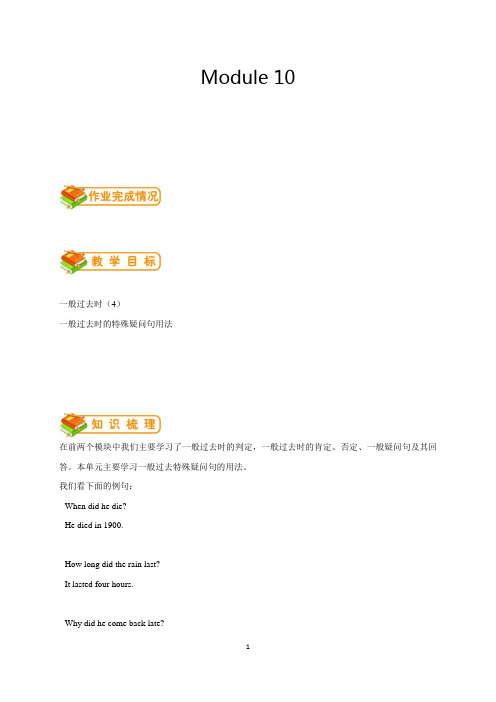
Module 10____________________________________________________________________________________________________________________________________________________________一般过去时(4)一般过去时的特殊疑问句用法在前两个模块中我们主要学习了一般过去时的判定,一般过去时的肯定、否定、一般疑问句及其回答。
本单元主要学习一般过去特殊疑问句的用法。
我们看下面的例句:--When did he die?--He died in 1900.--How long did the rain last?--It lasted four hours.--Why did he come back late?--Because he wanted to finished the work.综上,我们发现一般过去时的特殊疑问句的用法与一般现在时的特殊疑问句在结构上没有太大的差异,只是使用的助动词不同而已。
单项选择1.--__________did you go there?--Two years ago.A.WhenB.WhereC.WhyD.How答案:A解析:考查一般过去时特殊疑问句的用法,根据回答“两年前”故答案是A。
2.--__________did it take to get there?--About nine hours.A.How farB.How oftenC.How longD.How many答案:C解析:考查一般过去时特殊疑问句的用法,根据回答“9个小时”是时间段故选C。
3.--__________did you buy?--Two bags.A.WhenB.WhereC.WhyD.What答案:D解析:根据句子回答可知是买了什么,故选D。
最全面人教版七年级下册英语第十单元知识点归纳总结
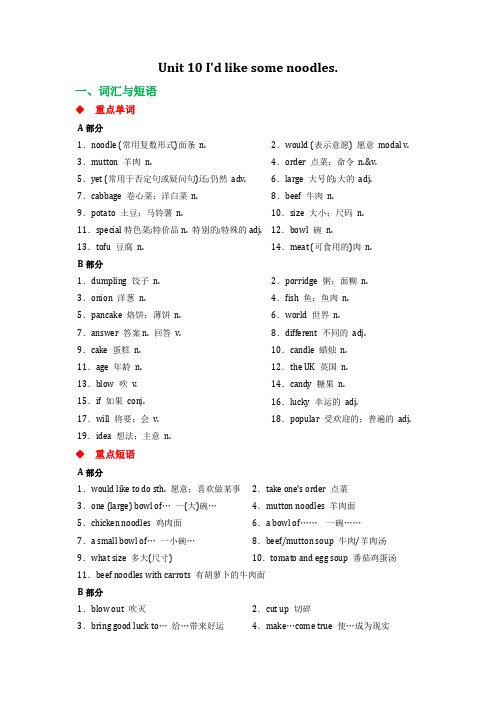
Unit 10 I'd like some noodles.一、词汇与短语◆重点单词A部分1.noodle (常用复数形式)面条n.2.would (表示意愿) 愿意modal v. 3.mutton 羊肉n.4.order 点菜;命令n.&v.5.yet (常用于否定句或疑问句)还;仍然adv.6.large 大号的;大的adj. 7.cabbage 卷心菜;洋白菜n.8.beef 牛肉n.9.potato 土豆;马铃薯n.10.size 大小;尺码n. 11.special特色菜;特价品n. 特别的;特殊的adj.12.bowl 碗n.13.tofu 豆腐n.14.meat (可食用的)肉n.B部分1.dumpling 饺子n.2.porridge 粥;面糊n. 3.onion 洋葱n.4.fish 鱼;鱼肉n.5.pancake 烙饼;薄饼n.6.world 世界n.7.answer 答案n. 回答v.8.different 不同的adj.9.cake 蛋糕n.10.candle 蜡烛n.11.age 年龄n.12.the UK 英国n.13.blow 吹v.14.candy 糖果n.15.if 如果conj.16.lucky 幸运的adj.17.will 将要;会v.18.popular 受欢迎的;普遍的adj. 19.idea 想法;主意n.◆重点短语A部分1.would like to do sth. 愿意;喜欢做某事2.take one's order 点菜3.one (large) bowl of…一(大)碗…4.mutton noodles 羊肉面5.chicken noodles 鸡肉面6.a bowl of……一碗……7.a small bowl of…一小碗…8.beef/mutton soup 牛肉/羊肉汤9.what size 多大(尺寸)10.tomato and egg soup 番茄鸡蛋汤11.beef noodles with carrots 有胡萝卜的牛肉面B部分1.blow out 吹灭2.cut up 切碎3.bring good luck to…给…带来好运4.make…come true 使…成为现实5.on one's birthday 在某人生日那天6.in different countries 在不同的国家7.green tea 绿茶8.the number of……的数量9.one's age 某人的年龄10.make a wish 许愿11.around the world 全世界12.in the UK 在英国13.all the candles 所有的蜡烛14.come true 实现15.in one go 一口气16.a birthday cake 一块生日蛋糕17.put…into…把…放进…里18.in China 在中国19.get popular受欢迎;流行20.many people 许多人21.eat very long noodles 吃长寿面22.cut up 切碎23.a symbol of……的象征24.long life 长寿25.Chinese people 中国人26.good luck 好运27.the same 一样28.ask for要求得到29.for five yuan以五元的价格30.birthday cakes with candles带有蜡烛的生日蛋糕◆重点句子A部分1.—What size would you like? 你们想要多大碗的?—I'd like a large bowl, please. 就来大碗的吧。
- 1、下载文档前请自行甄别文档内容的完整性,平台不提供额外的编辑、内容补充、找答案等附加服务。
- 2、"仅部分预览"的文档,不可在线预览部分如存在完整性等问题,可反馈申请退款(可完整预览的文档不适用该条件!)。
- 3、如文档侵犯您的权益,请联系客服反馈,我们会尽快为您处理(人工客服工作时间:9:00-18:30)。
Unit 10 语法篇____________________________________________________________________________________________________________________________________________________________________熟练掌握本章重点语法知识。
There be句型There be句型的基本用法是表示“某地(或某时)有某人(或某物)”,其形式为“Therebe+代词或名词(短语)+地点/时间状语”。
这里there是引导词,没有词义,be是谓语动词,代词或名词(短语)是主语。
be要与主语保持人称和数的一致。
否定句是在be后加not;一般疑问句是将be放在句首;反意疑问句中的简短问句是由“be(或其否定式)+there”构成。
例如:1.There is a desk and two chairs in the room.(紧挨着be动词的主语是a desk,是单数,故be的形式要用is)2.There aren't two chairs and a desk in the room.(否定句)3.Is there anything wrong with your ears?(Yes,there is./No,there isn't.)4.There wasn't a meeting yesterday,was there?(反意疑问句)除此之外,还有一个重要句式“有某人在做某事”,要用“There be+sb.+doing sth.+地点/时间状语”。
例如:There are several children swimming in the river.河里有几个孩子在游泳。
There be 结构中常见的时态有如下几种情况:通过上表可知:各种时态的变化是通过 be动词的变化来体现的。
至于你提到的两个句子我们先不考虑对错,首要的问题是弄清楚There be与have所表示的意义。
There be句型表示“存在”关系,have 表示“所属”关系,两者不能混合在一个句子中。
例如,要说“明天有一个班会。
”(1)There will have a class meeting tomorrow.(×)(2)There is going to/will be a class meeting tomorrow.(√)有时(“地候既表示“存在”又表示“所属”时两种都可以用。
例如:Class Three have a map of China on the wall.图”为三班学生所有)There is a map of China on the wall in Class Three.(“地图”存在于三班)由此看来,There will have是错误的。
复习There be句型时除了掌握基础知识外,还应注意以下问题:1.There be句型的考查更多的是将be动词与主语结合在一起进行的,即主谓的一致性。
例如:(1)There is _____ on the floor.(2)There are _____ on the floor.选项:A.cat B.water C.boxes D.football解析:(1)由is可知主语应是可数名词单数或不可数名词,而A、D项中都缺少冠词a,故选B,同理可知(2)应选C。
2.如果作主语的是一个短语,则常常考查短语中的修饰语。
可数名词的复数形式前可以用any,som e,few,a few,m any或用数词+hundred/thousand/million,hundreds/ thousands/millions of,no等修饰;不可数名词可以受any,some,no,little,a little,much等词的修饰。
例如:(1)There were _____ students in our school.A.hundreds B.eight hundred C.eight hundreds of(2)There is _____ water.You needn't get some more.A.few B.little C.much解析:(1)由数词与名词的搭配关系可知选B,(2)由water可知排除A项,再由后一句意思便知选C。
3.注意不定代词的用法。
(1)不定代词在句中作主语,谓语动词要用单数形式。
例如:There is nothing in the fridge.(2)不定代词受形容词修饰时要放在形容词的前面。
例如:There is something interesting in today's newspaper.4.There be句型的反意疑问句,要注意陈述部分的形式。
如果陈述部分含有little,few,no,nobody,none等否定词时,后面的简短问句中要用肯定形式。
例如:There is nobody in the room,is there?但有的含有否定意义的形容词修饰不定代词时则仍看作肯定句式。
例如:There is something unusual in the room,isn't there?5.要注意句子前后意思的一致性。
有的句子单独看其意义时,可能不止一个选项适合于它,但如果联系上下句的意思则只能有一个恰当的选项。
例如:(1)There is _____ food.You needn't buy any.(2) There is _____ food.Youhave to buy some.(A.any B.some C.no)从这两题中的第一个句子来看均可选用some和no,但与后面的句意结合看,答案则是唯一的:(1)B,(2)C。
There be句型命题趋向有两个方面:一是进一步加强对知识的理解与运用方面的考查。
例如be动词与主语的一致性、名词或代词的修饰语、搭配关系、含否定词的反意疑问句等。
二是有可能出现“有某人在做某事”这一句型,即“There be+sb.+doing sth.+地点/时间状语”。
1.There are few _____ in the fridge.Let's go and buy some peas,carrots and cabbages.A.vegetables B.fruit C.meat D.eggs2.Look!There are some _____ on the floor.A.child B.water C.boxes D.girl3.There _____ an English Evening next Tuesday.A.was B.will be C.will have D.are going to be4.There _____ a football game in our school.A.has B.will have C.will be5.There is _____ food here.We'll have to buy some.A.any B.some C.no解析:1. 因为是few,所以为可数名词,根据回答是蔬菜,故选A。
2. 因为是are,所以为可数名词复数,故选C。
3. 因为是there be句型,同时为将来时态,故选B。
4. 因为是there be句型,和have,has不能混用,故选C。
5. 因为是不可数名词,同时后面是没有,故选C。
基础演练一、单项选择(共5小题;共5.0分)1. --- Could you give me money?--- Sorry. I don't have with me.A. some; anyB. little; someC. any; someD. little; any2. Do you know how many a horse has and how many a bee (蜜蜂) has?A. teeth; feetB. tooth; footC. tooth; feetD. teeth; foot3. How many can you see in the picture?A. sheepsB. sheepC. treeD. child4. some juice and milk in our fridge(冰箱).A. There haveB. There areC. There hasD. There is5. --- Would you like to come to my birthday party?--- .A. Yes, I'd likeB. Yes, I'd love toC. No, I'd not likeD. I don't like to二、按要求转换句型(共5小题;共10.0分)6. People would like to eat long noodles on their birthday. (对划线部分提问)people eat on their birthday?7. Here is a sandwich for you. (改为复数形式)Here for you.8. There are some trees in front of the library. (改为一般疑问句,并作否定回答)--- trees in front of the library?--- , .9. I want a medium bowl of noodles, please. (对划线部分提问)bowl of noodles you , please?10. I would like to listen to music. (改为一般疑问句)you listen to music?巩固提高三、翻译(根据中文提示完成句子)(共5小题;共5.0分)11. 你想要哪种面条?noodles would you like?12. 我想要中碗的牛肉西红柿面。
I would like a of noodles beefand .13. --- 你在学校有些朋友吗?--- 是的,我有一些外国朋友。
--- Do you have friends at school?--- Yes, I have foreign friends.14. 你听什么种类的音乐?do you listen to?15. --- 你愿意加入我们吗?--- 是的,我愿意。
